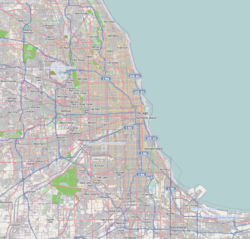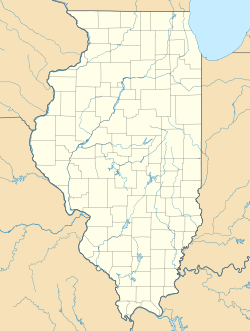Riverside, Illinois facts for kids
Quick facts for kids
Riverside, Illinois
|
||
|---|---|---|
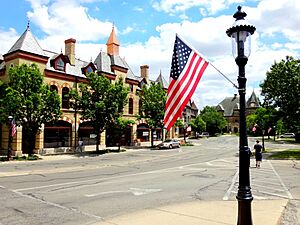
The Arcade Building and Riverside Town Hall
|
||
|
||
| Motto(s):
"The village in the forest"
|
||
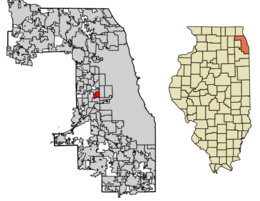
Location of Riverside in Cook County, Illinois.
|
||
| Country | ||
| State | Illinois | |
| County | Cook | |
| Township | Riverside | |
| Incorporated | 1875 | |
| Government | ||
| • Type | Board of Trustees and Village President | |
| Area | ||
| • Total | 2.00 sq mi (5.17 km2) | |
| • Land | 1.98 sq mi (5.12 km2) | |
| • Water | 0.02 sq mi (0.05 km2) 1.00% | |
| Population
(2020)
|
||
| • Total | 9,298 | |
| • Density | 4,700.71/sq mi (1,814.68/km2) | |
| Down 0.22% from 2000 | ||
| Standard of living (2022) | ||
| • Median Household Income | $149,464 ± $25,068 | |
| • Median home value | $397,200 | |
| ZIP code(s) |
60546
|
|
| Area code(s) | 708 | |
| Geocode | 54820 | |
| FIPS code | 17-64421 | |
|
Riverside Landscape Architecture District
|
|
| Location | Bounded by 26th St., Harlem and Ogden Aves., the Des Plaines River, and Forbes Rd., Riverside, Illinois |
|---|---|
| Built | 1869 |
| Architect | Frederick Law Olmsted; Calvert Vaux |
| NRHP reference No. | 69000055 |
| Added to NRHP | September 15, 1969 |
Riverside is a village in Cook County, Illinois, United States. It's a suburb of Chicago, located about 9 miles (14 km) west of downtown Chicago. In 2020, about 9,298 people lived there.
A big part of Riverside is known as the Riverside Landscape Architecture District. This area was named a National Historic Landmark in 1970 because of its special design.
Contents
History of Riverside
Riverside is famous for being one of the first "planned communities" in the United States. This means it was designed from scratch, not just built piece by piece. It was created in 1869 by two well-known landscape architects, Calvert Vaux and Frederick Law Olmsted. The village officially became a town in 1875.
How Riverside Was Planned
In 1863, a railroad line was built from Chicago towards Quincy, Illinois. This new train access made the farmland near Chicago a great place for new homes. In 1868, a businessman named Emery E. Childs bought a large piece of land, about 1,600 acres (6.5 km²), along the Des Plaines River and the new railroad.
He hired Frederick Law Olmsted and Calvert Vaux to design a beautiful, natural-looking community. Their plan, finished in 1869, included:
- Curvy streets that followed the shape of the land and the winding river.
- A main village square near the train station.
- A large park system with many smaller triangular parks and plazas. These green spaces were placed at intersections all over town.
Growth and Development
After the Great Chicago Fire in 1871 and a financial crisis in 1873, building slowed down. But in September 1875, a village government was set up, and Olmsted's original plan was kept.
Building picked up again later. The Riverside Golf Club opened in 1893, and the impressive Riverside Township Hall was built in 1895. The train station for the Burlington line opened in 1901. Many famous architects, like Frank Lloyd Wright and Daniel Burnham, designed homes and estates in Riverside during this time.
More homes were built in the 1920s and late 1930s. By 1960, most of the village was developed. Riverside's population reached its highest point in 1970 with 10,357 people.
Today, Riverside is like an "architectural museum" because of its unique buildings. You can find many different types of homes, from 1920s bungalows to large Victorian mansions. People often take tours to see these special houses. The village center has shops, cafes, and antique stores. In 2018, Riverside was named one of the "Illinois 200 Great Places" to celebrate the state's 200th birthday.
Geography of Riverside
Riverside is located at 41.830881 degrees North latitude and -87.815981 degrees West longitude.
The village covers about 1.998 square miles (5.17 km²). Most of this area is land, with a small part being water. The Des Plaines River flows through the village, near an area called Swan Pond.
Riverside is bordered by several other suburbs:
- To the north: North Riverside
- To the east: Berwyn
- To the southeast: Stickney and Forest View
- To the south: Lyons and McCook
- To the west: Brookfield
Population Information
| Historical population | |||
|---|---|---|---|
| Census | Pop. | %± | |
| 1900 | 1,551 | — | |
| 1910 | 1,702 | 9.7% | |
| 1920 | 2,532 | 48.8% | |
| 1930 | 6,770 | 167.4% | |
| 1940 | 7,935 | 17.2% | |
| 1950 | 9,153 | 15.3% | |
| 1960 | 9,750 | 6.5% | |
| 1970 | 10,357 | 6.2% | |
| 1980 | 9,236 | −10.8% | |
| 1990 | 8,774 | −5.0% | |
| 2000 | 8,895 | 1.4% | |
| 2010 | 8,875 | −0.2% | |
| 2020 | 9,298 | 4.8% | |
| U.S. Decennial Census | |||
As of the 2020 census, there were 9,298 people living in Riverside. There were 3,238 households and 2,424 families. About 35% of households had children under 18 living with them. The average household had about 3.2 people.
The village's population includes people of various ages:
- 25.4% were under 18 years old.
- 17.4% were 65 years or older.
The average age in Riverside was 44.2 years.
2020 Census Details
| Race / Ethnicity (NH = Non-Hispanic) | Pop 2000 | Pop 2010 | Pop 2020 | % 2000 | % 2010 | % 2020 |
|---|---|---|---|---|---|---|
| White alone (NH) | 8,168 | 7,535 | 7,074 | 91.83% | 84.90% | 76.08% |
| Black or African American alone (NH) | 23 | 110 | 161 | 0.26% | 1.24% | 1.73% |
| Native American or Alaska Native alone (NH) | 7 | 7 | 4 | 0.08% | 0.08% | 0.04% |
| Asian alone (NH) | 140 | 184 | 200 | 1.57% | 2.07% | 2.15% |
| Pacific Islander alone (NH) | 1 | 1 | 0 | 0.01% | 0.01% | 0.00% |
| Other race alone (NH) | 5 | 19 | 41 | 0.06% | 0.21% | 0.44% |
| Mixed race or Multiracial (NH) | 62 | 84 | 298 | 0.70% | 0.95% | 3.20% |
| Hispanic or Latino (any race) | 489 | 935 | 1,520 | 5.50% | 10.54% | 16.35% |
| Total | 8,895 | 8,875 | 9,298 | 100.00% | 100.00% | 100.00% |
Education in Riverside
Riverside has its own public school district, District 96. This district includes four elementary schools and one junior high school. High school students in Riverside attend District 208.
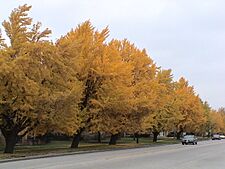
Elementary Schools
- Central Elementary School at 61 Woodside Road
- Ames School at 86 Southcote Road
- Blythe Park School at 735 Leesley Road
- Hollywood School (located in Brookfield) at 3423 Hollywood Avenue
Middle School
- L. J. Hauser Junior High School at 65 Woodside Road
High School
- Riverside Brookfield High School, often called RB, at 160 Ridgewood Road
Private Schools
- Riverside Presbyterian Pre-School
- St. Paul's Building Blocks Pre-School
- St. Mary Catholic Elementary School
- Tallgrass Sudbury School
Transportation
Riverside has a train station for Metra commuter trains on the BNSF Line. These trains travel between Aurora and Chicago. The Hollywood and Harlem Avenue Metra stations are also nearby.
Pace bus services (routes 302, 307, and 331) help connect Riverside to other places in the area.
Notable People from Riverside
Many interesting people have lived in Riverside, including:
- Robert Todd Lincoln Beckwith, the last direct descendant of Abraham Lincoln.
- Clare Briggs, a famous cartoonist who created one of the first daily newspaper comic strips.
- Telford Burnham, a lawyer and brother of architect Daniel Burnham.
- Patrick Creadon, a filmmaker.
- Jean Fenn, an opera singer.
- George Hunt, who was the Illinois Attorney General.
- Johnny "Red" Kerr, a professional basketball player and coach for teams like the Chicago Bulls. He was also a longtime Bulls broadcaster.
- Tom Kondla, a professional basketball player.
- Ring Lardner, a well-known newspaper and short story writer.
- Martin E. Marty, a scholar who studied religion.
- Judy Baar Topinka, a state politician who served as Illinois State Comptroller and Treasurer.
Local Businesses
The main business area in Riverside is located around the Riverside Metra station. Here, you can find various shops, cafes, banks, and offices that help people manage their money.
See also
 In Spanish: Riverside (Illinois) para niños
In Spanish: Riverside (Illinois) para niños



